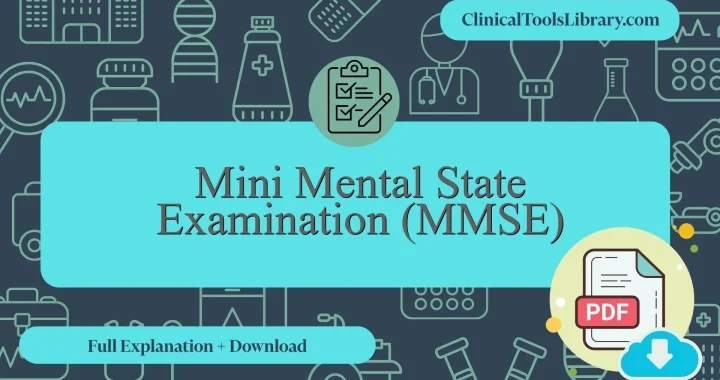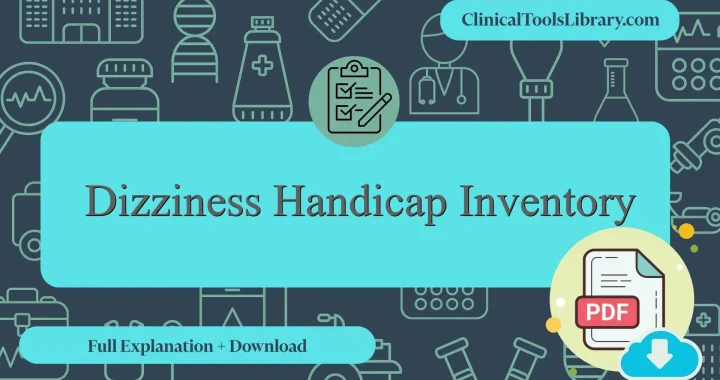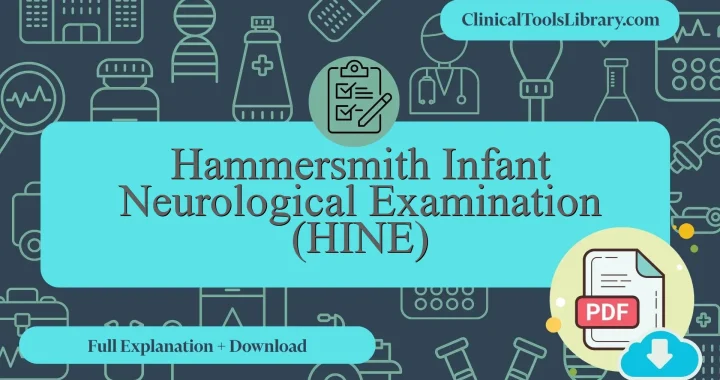In this article, we explain everything you need to know about the Mini Mental State Examination (MMSE). We will cover the aspects it evaluates, the target population, a detailed step-by-step explanation, and how to interpret its results. Additionally, we will dive into the scientific evidence supporting this tool (diagnostic sensitivity and specificity) in clinical assessment. You will also find official and unofficial sources available for download in PDF format.
What does the Mini Mental State Examination (MMSE) assess?
The Mini Mental State Examination (MMSE) is a widely used cognitive screening tool designed to assess cognitive impairment by evaluating functions such as orientation, attention, memory, language, and visuospatial skills. Its main purpose is to provide a brief, quantitative measure of cognitive status, which aids clinicians in the diagnosis and monitoring of conditions like dementia and other neurocognitive disorders. The MMSE score is obtained by administering a standardized set of items, often referred to as the Mini Mental test 10 questions, and can be interpreted using established guidelines for MMSE score interpretation. Healthcare professionals frequently utilize resources such as the Mini Mental State Examination form and Mini Mental status Examination PDF to ensure consistent administration. Additionally, versions like the Mini Mental State Examination NHS PDF and MMSE printable facilitate accessibility and reproducibility across clinical settings.
For which type of patients or populations is the Mini Mental State Examination (MMSE) intended?
The Mini Mental State Examination (MMSE) is indicated primarily for patients presenting with suspected cognitive impairment or dementia, including those with conditions such as Alzheimer’s disease and other neurodegenerative disorders. It is most useful in clinical contexts requiring rapid assessment of cognitive functions such as orientation, memory, attention, language, and visuospatial skills. The MMSE score provides an objective measure to aid in screening, baseline cognitive evaluation, and monitoring progression or response to treatment. Utilization of the Mini Mental State Examination form or referential documents like the Mini Mental State Examination NHS PDF ensures standardized administration, which is crucial for accurate MMSE score interpretation. This tool is especially valuable in geriatric, psychiatric, and neurological settings where early detection of cognitive decline significantly impacts management decisions.
Step-by-Step Explanation of the Mini Mental State Examination (MMSE)
The Mini Mental State Examination (MMSE) consists of 30 items designed to assess cognitive function across several domains, including orientation, registration, attention and calculation, recall, language, and visuospatial skills. The clinician begins by asking the patient to state the current date and location to evaluate orientation. Next, three objects are named for immediate repetition, testing registration. The patient then performs serial subtraction or spells a word backward to assess attention and calculation. Following a short delay, recall of the three objects is requested. Language assessment involves naming common objects, repeating phrases, following multi-step commands, reading and writing sentences, as well as copying a complex polygon, which also evaluates visuospatial abilities. Responses are typically verbal or require the completion of tasks, scored objectively to identify cognitive impairment indicative of conditions such as Alzheimer’s disease or other forms of dementia. The standardized scoring ranges from 0 to 30, with lower scores correlating to greater cognitive decline.
Downloadable MMSE PDF Resources: Mini Mental State Examination Forms & Scoring Guidelines
Below, users will find downloadable resources for the Mini Mental State Examination form available in both the original language and English versions in PDF format. These materials facilitate accurate assessment of cognitive function, providing standardized tools essential for evaluating patients with suspected cognitive impairment. The resources include the full Mini mental test 10 questions and guidelines for proper administration and scoring, ensuring reliable determination of the MMSE score interpretation. Healthcare professionals can utilize these MMSE printable documents to support clinical decision-making and track changes in mental status over time.
How to interpret the results of the Mini Mental State Examination (MMSE)?
The Mini Mental State Examination (MMSE) test generates a score ranging from 0 to 30, which is used to objectively assess cognitive function. Scores between 24 and 30 generally indicate normal cognition, whereas values from 18 to 23 suggest mild cognitive impairment, and scores below 18 are indicative of more severe cognitive deficits, often associated with dementia. Healthcare professionals interpret these results in conjunction with clinical judgment and patient history to determine the presence and severity of conditions such as Alzheimer’s disease or other neurocognitive disorders. The MMSE score can be expressed as a percentage of the total possible points, calculated by (Score/30) × 100%, aiding in the quantification of cognitive decline. In practical terms, lower MMSE scores prompt further diagnostic evaluation, guide treatment planning, and assist in monitoring disease progression or response to therapy.
What scientific evidence supports the Mini Mental State Examination (MMSE) ?
The Mini Mental State Examination (MMSE) was developed in 1975 by Folstein et al. as a brief, standardized tool to assess cognitive impairment, primarily in older adults. Its validation involved extensive studies comparing MMSE scores with clinical diagnoses of Alzheimer’s disease and other forms of dementia, demonstrating strong correlations with severity levels. Subsequent research has confirmed its reliability and validity across diverse populations and settings, with sensitivity values typically ranging from 70% to 90% for detecting cognitive decline. The test’s standardized scoring and ease of administration have contributed to its widespread acceptance in clinical practice and research, supporting its use as a screening instrument for cognitive dysfunction in various neurological conditions.
Diagnostic Accuracy: Sensitivity and Specificity of the Mini Mental State Examination (MMSE)
The Mini Mental State Examination (MMSE) demonstrates a sensitivity ranging between 70% and 90% in detecting cognitive impairment, including Alzheimer’s disease. Its specificity typically varies from 60% to 85%, depending on the cutoff score and population studied. While the MMSE is effective in identifying moderate to severe cognitive deficits, its sensitivity diminishes in cases of mild cognitive impairment. The test’s specificity can also be influenced by educational level and cultural factors, which may lead to false-positive or false-negative results in certain demographic groups. Overall, the MMSE remains a widely utilized screening tool due to its balance of sensitivity and specificity but should be interpreted within the broader clinical context.
Related Scales or Questionnaires
The Montreal Cognitive Assessment (MoCA) and the Clock Drawing Test (CDT) are among the most comparable tools to the Mini Mental State Examination (MMSE) for screening cognitive impairment. MoCA offers greater sensitivity in detecting mild cognitive impairment, particularly in Alzheimer’s disease, although it requires slightly more training and time to administer compared to the MMSE. The CDT is quicker and simpler but may lack comprehensive domain assessment, limiting its use as a standalone tool. The Saint Louis University Mental Status (SLUMS) exam similarly provides enhanced detection of early dementia stages but is less widely validated internationally. These alternative scales and questionnaires, along with the MMSE score interpretation and various forms such as the Mini Mental status Examination PDF and Mini Mental State Examination form, are detailed and freely available for download on ClinicalToolsLibrary.com, facilitating clinical application and research. While the MMSE remains popular for its ease of use and standardization, practitioners should consider such alternatives for more nuanced cognitive evaluations.




